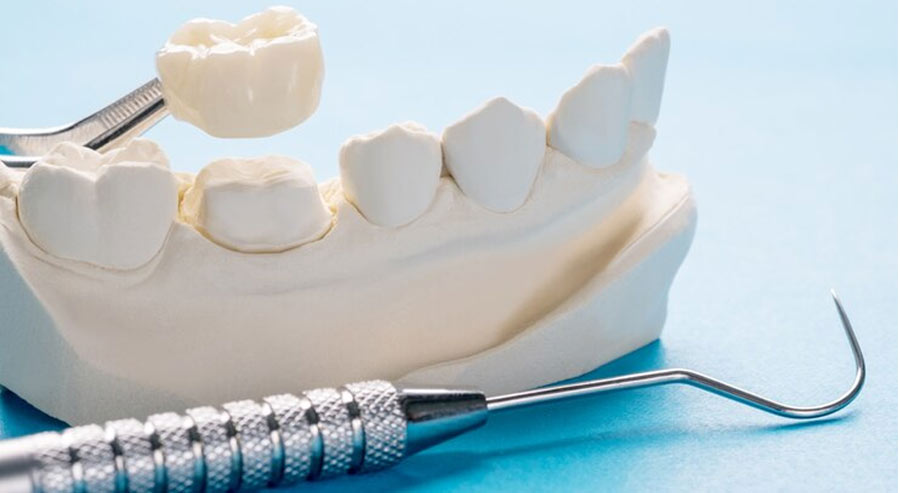Unlock the Secret to a Healthier, Happier Smile with Full Mouth Rehabilitation

Restoring the function, health and appearance of a patient's teeth, gums and jaw is the goal of full mouth rehabilitation, sometimes referred to as full mouth restoration or reconstruction. It includes a mix of prosthetic, aesthetic and restorative dental procedures designed to satisfy each patient's particular requirements. People with extensive dental problems, such as severe tooth decay, missing teeth, gum disease, biting abnormalities or facial traumas, are frequently advised to have this surgery done.
What Is Full Mouth Rehabilitation?
A customised dental treatment program called "full mouth rehabilitation" aims to replace and
restore every tooth in the upper and lower jaws. It is a thorough method that focusses on long- term dental health, functionality, and aesthetics while addressing several oral health concerns at once.
Full mouth rehabilitation adopts a comprehensive approach, taking into consideration how different dental procedures interact to produce a totally restored and healthy smile, in contrast to individual dental procedures that focus on certain issues.
Who Needs Full Mouth Rehabilitation?
Full Mouth Rehabilitation is recommended for individuals experiencing one or more of the following dental issues:
1. Multiple Missing Teeth
Losing several teeth due to decay, injury, or gum disease can severely affect chewing, speaking, and the overall appearance of the face.
2. Severe Tooth Damage
Teeth damaged by fractures, grinding (bruxism), or acid erosion require extensive restoration to regain full functionality.
3. Extensive Tooth Decay
When tooth decay affects many teeth, restorative procedures such as crowns, bridges, or implants may be necessary.
4. Gum Disease (Periodontitis)
Advanced gum disease can cause tooth loss, jawbone deterioration, and gum recession, requiring specialized periodontal treatments.
5. Bite and Jaw Problems
Bite misalignment or issues related to the temporomandibular joint (TMJ) can cause jaw pain, headaches, and uneven tooth wear, requiring bite correction.
6. Facial or Dental Trauma
Injuries from accidents that result in broken, chipped, or lost teeth need urgent and comprehensive dental treatment.
7. Aesthetic Concerns
Discolored, misshapen, or unevenly spaced teeth can negatively impact one’s appearance, leading to a need for cosmetic restoration.
Benefts of Full Mouth Rehabilitation
Full Mouth Rehabilitation offers numerous benefts that go beyond aesthetics. Here’s how it can positively impact your oral health and quality of life:
1. Restored Oral Function
One of the most important benefts of full mouth rehabilitation is the restoration of oral functionality. By addressing missing or damaged teeth, it becomes easier to chew, bite, and speak properly.
2. Enhanced Smile Aesthetics
Cosmetic improvements such as veneers, crowns, and teeth whitening create a natural, bright, and symmetrical smile that can boost confdence.
3. Improved Oral Health
By treating cavities, gum disease, and tooth damage, full mouth rehabilitation reduces the risk of future oral health issues, helping maintain long-term dental wellness.
4. Relief from Pain and Discomfort
Dental problems such as TMJ disorders, tooth sensitivity, and facial pain can be alleviated, providing signifcant comfort and pain relief.
5. Increased Self-Confdence
A restored smile can improve self-esteem, making social interactions more enjoyable and boosting overall confdence.
6. Long-Term Durability
Modern materials used in dental restorations, such as porcelain and zirconia, are highly durable, ensuring long-lasting results with proper care.
7. Prevention of Bone Loss
Restorative treatments like dental implants help stimulate the jawbone, preventing bone loss and facial sagging due to missing teeth.
8. Corrected Bite Alignment
Addressing bite problems through orthodontics or prosthodontic restorations ensures even pressure distribution while chewing, reducing jaw strain and wear on teeth.
9. Comprehensive Dental Care
Full mouth rehabilitation consolidates multiple procedures into a single, well-coordinated treatment plan, simplifying the restoration process.
10. Better Speech and Pronunciation
Missing or damaged teeth can affect speech clarity. Replacing or restoring teeth can improve pronunciation and speaking ability.
Aftercare and Maintenance Tips
After completing full mouth rehabilitation, it’s essential to follow proper aftercare guidelines to maintain the results and prevent future dental issues:
Practice Good Oral Hygiene: Brush and foss regularly using dentist-recommended products. Attend Regular Dental Checkups: Schedule dental visits every six months for professional cleanings and checkups.
Avoid Harmful Habits: Refrain from smoking, biting nails, and chewing hard objects like ice. Wear a Night Guard: Consider wearing a custom-made night guard if you have a history of teeth grinding or bruxism.
Maintain a Balanced Diet: Limit sugary and acidic foods to protect teeth and gums. Follow Dentist's Instructions: Adhere to any specifc care instructions given by your dentist.
Full mouth rehabilitation is a life-changing dental procedure designed to restore oral health, functionality, and aesthetics. By addressing a wide range of dental problems through customized treatment plans, it offers patients the chance to regain their confdence, improve their quality of life, and enjoy long-lasting dental health.
Dr. Manish Agrawal delivered an insightful lecture on Full Mouth Rehabilitation at Dentcon 2024, organized by the IDA Dhule Branch. With a passion for advancing dental excellence, he shared the latest techniques and best practices in restorative dentistry. It was a rewarding experience to engage with fellow dentists and students, fostering knowledge exchange and professional growth in the feld of dentistry.


